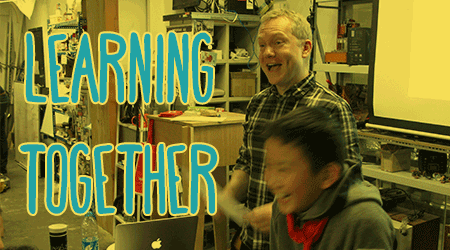

Careers 15 years from now are going to demand vastly different skill sets. Future leaders will not only need to understand science, math, and technology, but also be able to collaborate, think critically and creatively, and have respect and empathy for others.
By starting to develop these skills early, children have better chances of becoming not only successful but also finding their true passion in life.
Mixed Curriculums
We combine these curriculums together to create many possibilities for students of all ages.
Robotics
Robotics requires learning many new skills, but it doesn't have to be boring or difficult. We use simple but flexible robotics toolkits using micro:bit controllers programmed using visual coding blocks. We give our robots personalities to make them unique and to be able to tell stories about them.
Coding
Coding doesn't have to be boring, and not everyone needs to be a coder. But everyone can use a little bit of computational thinking and simple programming logic to create interesting things. We use microbit and scratch visual programming languages for beginners, and utilize arduino, processing, javascript, python, and others for more complex projects.
Art
Art is not just about hand-crafts, we make art using latest technology as well as our hands. From creative coding, to digital fabrication, to ceramics and plastics, we do it all.
Science
Learning about the world around us is important if we ever want to solve important problems, but learning about science shouldn't be only about sitting in a classroom. We utilize project based learning to make sure that science is part of every project we complete.
Engineering
The things we make not only should look good but they should also function well. We learn basic engineering skills to make sure that we can make almost anything our imaginations come up with.
3D Printing
Digital fabrication allows us to iterate quickly and create with minimal waste. We start out by using simple 3D modeling software such as TynkerCAD and move to fully functional software such as Fusion 360 as our experience and confidence grows. We not only design, prototype, and fabricate things that function well but also things that look good.
What We Offer

Workshops
Small size and hands-on
Our workshops allow students to learn by doing by working on focused but open-ended challenges that provide room for creativity and self-expression while learning new topics and skills

After school programs
Primary, Middle, and High School
We provide various topics/themes for after-school programs, depending on school's needs and interests.

Curriculum Design
Daily and Weekly
If your school already has teachers that are comfortable technology we can help designing custom curriculums: "Art and Technology" "Science and Coding" ,etc

Individual Projects
Portfolio Pieces
Some students planning on studying abroad will need to provide portfolios of their past work, we can help students develop their passions and align their projects with areas that interest them.

Family Days and Teambuilding
Fun Learning
We work with companies to provide family-style hands-on workshops as well as team building activities.

There is only one true way of learning how to do something and that is do it.There is no need for long lectures and preparation, its best to jump right in and start trying.

Letting students make small mistakes and learn from them instead of telling them exactly what to do. Our role is to provide a safe and comfortable environment with no judgment so that students feel confident and secure in trying things on their own.

Learning together allows us to learn from each other. We all see things differently and sharing our views helps us get a fuller picture.

Learning is not all about following directions, but too much direction can stop the creative process. Students are encouraged to make their own choices, take risks, and trust their own judgements.
About Us
Squiggle Labs was founded with a single goal in mind - to provide fun workshops where everyone can learn not by listening but by doing. Through playing and making things together students develop social and cognitive skills, grow emotionally, and gain self-confidence and critical thinking skills needed to excel in the future.
The methods employed are based on modern learning-through-play theories, including constructionist learning - where students learn most effectively when they are active in making tangible objects in real world.
"...the teacher’s role is not to lecture or provide structured activities that guide students, step by step...Instead, teachers in a constructivist classroom are called to function as facilitators who coach learners as they blaze their own paths toward personally meaningful goals" - Alesandrini, K. & Larson













